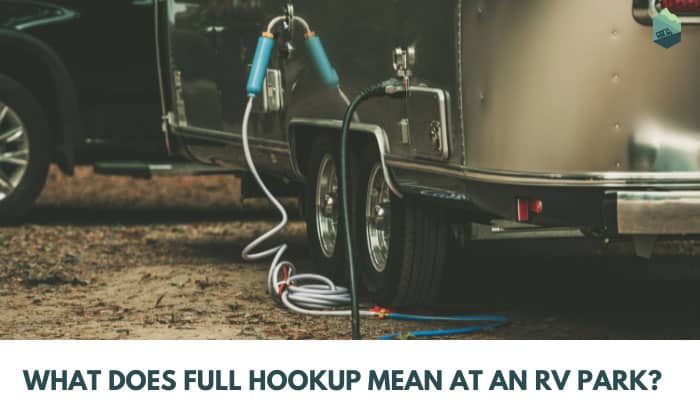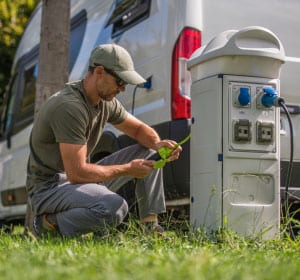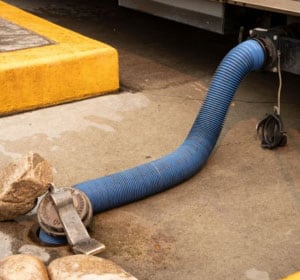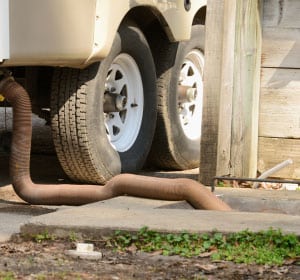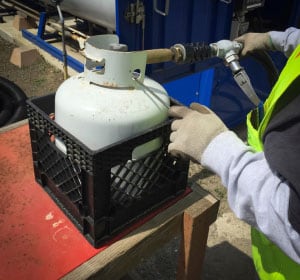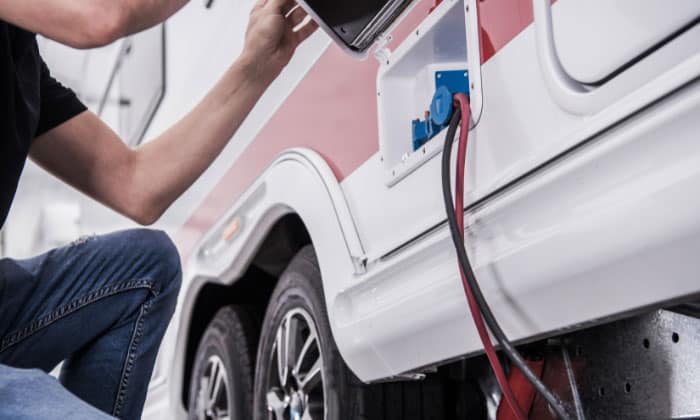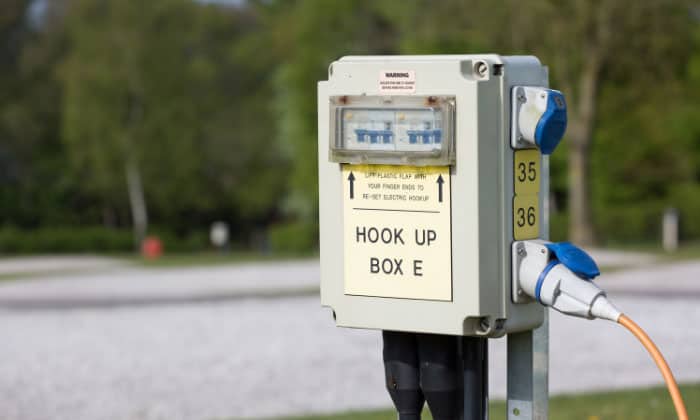Planning an RV camping trip is exciting. At the same time, it can be overwhelming. The latter is especially true if you’re a first-timer. You’ll need to know a lot of things, and with this, there’s one question most people ask – what does full hookup mean at an RV park?
In a nutshell, a full hookup means you’ll have water, electricity, and sewer access. This is convenient, since you can make your RV your home during your stay, providing all the conveniences you need for a memorable trip.
Keep on reading and learn more about what full hookup mean when camping.
Page Contents
What is a Full RV Hookup and What It Includes
As noted earlier, full hookup RV sites are locations offering access to water, electricity, and sewer, each of which will be discussed separately below.
Campsites install RV hook ups so that most of the things you need are within arm’s reach and that you’ll have a good time.
1. Electricity
From charging your phone to running your appliances, an electrical supply in a campsite full hookup is useful in more ways than one. This is where you can plug your RV, and in turn, satisfy your electrical needs.
- While it can vary, a typical RV electrical hookup will have an option for 30 or 50 amps. If you have a large camper and demanding appliances, 50-amp hookups are better.
- On the other hand, for smaller motorhomes and fewer appliances, a 30-amp electrical supply would suffice.
One of the best things about having an electrical RV hookup on the property is that you and others will not need to use a generator. Hence, it also means that the site will be quieter, making it easier to sleep.
2. Water
Like at home, water is a necessity in RV campsites. Most motorhomes will have a tank that can accommodate 20 to 100 gallons of liquid.
However, these tanks will eventually be empty, and you’ll need a refill to have water for drinking, cooking, and other activities.
When the time comes that you need to replenish the tank, you’ll be thankful for being in full hookup campgrounds.
While there can be differences from one RV park to another, fresh drinking water is often designated by the presence of a white hose or signage. If there’s no indication, don’t use the water supply for drinking.
Before connecting to the hookup, you’ll need a few things. For instance, a water regulator is a must-have. It will control the flow of liquid. Otherwise, you’re risking potential RV pipe system damage. You might also need to use a water filter for your safety.
3. Sewer
RV parks with sewer hookups can be lifesavers, especially if you’re traveling or camping for a long time.
- With such a feature, you can empty your tanks during your stay at the park. This will refresh your waste draining system and can even help you get rid of foul smells.
- Aside from the perks mentioned above, there can also be optional extras, which can vary from one campsite to another. For instance, some will offer cable and internet, making it easier to be entertained, informed, and connected during your trip.
4. Propane
However, it’s very rare that propane is included in full hookup camping. In some cases, it might be offered, but you’ll need to go to a dedicated location to avail of the service.
Some might even offer tank pickup or golf cart service, making it easy to refill your propane supply.
The Cost of a Full Hookup
There’s no straightforward way to answer this question. The full hook up cost can vary, depending on the campsite location.
On average, the cost can be anywhere from $65 to $150 for one night. However, take note that pricing can fluctuate. For instance, the price can be more expensive during RV camping’s peak season in the summer because more people are on the campsite.
Pros and Cons of Full RV Hookups
Looking for more reasons to choose an RV campsite with a full hookup? Below are some notable advantages:
- Full Power For a long stay
From a portable AC to a small RV fridge, you can enjoy full power to run your appliances. Therefore, you can end up staying at the campsite for longer.
- No Need for a Generator
While generators can be life savers, they can be a hassle. Some are bulky while others are noisy. When you have a full hookup, the noise should not be an issue.
Despite the good things, this arrangement also comes with a few drawbacks, including the following:
- Expensive
The price can vary, but the cost can be an issue for some people. Nonetheless, this should not be a huge deterrent, given the convenience of RV camping with full hookup.
- Crowded Campsites
It’s possible that the campsite will be crowded. You’ll have neighbors close to your motorhome connecting to the same hookup.
The Difference Between Full vs Partial Hookups
As the name implies, a partial hookup is a campsite that offers limited service to its guests. In most cases, it will offer electricity and water but not sewer systems. Hence, you need to be mindful of how much waste you generate and plan the trip accordingly.
If you’re lucky, the partial hookup might have a dump station, which frees campers from having to drive somewhere else or seek a public restroom. Partial hookups are also cheaper than full ones, so they’re excellent for saving money.
Conclusion
In this short guide, we answered the question “what does full hookup mean at an RV park?” To recap, it means that you get access to electricity, water, and sewer. Meanwhile, some may offer additional conveniences, such as cable and internet.
“Hi, I’m Francis’ husband—Calvin. Our story began with our shared passion for traveling. I have had a career journey for over 11 years at Ford Motor Company, where I took on the role of BMS SW Process Engineer.
Together with my wife, I have dedicated countless hours to exploring every nook and corner of the world. Ten years living in an RV may seem long, but time seems to fly by when I’m doing what I love with the person I love.
FMCA’s 103rd International Convention & RV Expo in Gillette, WY,
Like my wife, I hope to help you see the beauty of traveling off the beaten path by sharing insights into this lifestyle. In addition to my corporate roles, I also launched our website – Outdoorbits, in 2015 and continue to contribute my knowledge and skills to the present day. And I’ll be completely honest with you—no hiding the truth or sugarcoating the possible challenges.
So, if you want to run away from the busy lifestyle to embrace nature, I’m your guy.”
